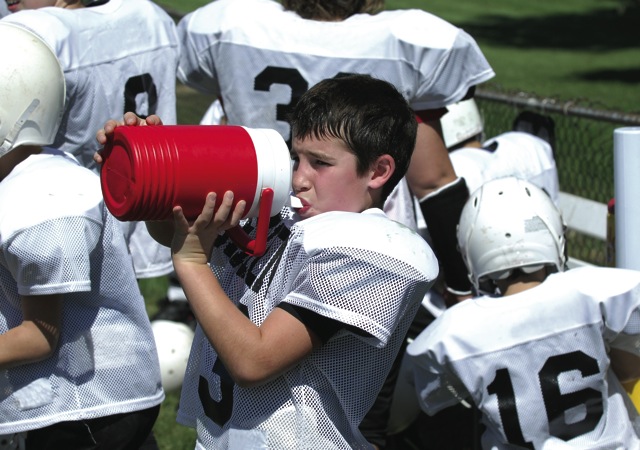A Good Look At Relationship Between Coaches & Referees
They may not be making dinner plans with each other during heated exchanges or swapping vacation stories once the final horn goes off. But when all the smoke clears and the screaming dies down and the euphoria of a win or the disappointment of a loss fades, a healthy working relationship between high school basketball coaches and the referees isn’t about all the hundreds of statistics in the book.
It comes down to three letters — CCR.Consistency. Communication. Respect.
“The No.1 thing that is important to me is communication and having officials that are willing to talk to you,” said Mentor coach Bob Krizancic, a 30-year veteran with more than 450 wins and a state title. “Consistency is huge as well. But maybe most importantly is to respect what they do and understand they are not going to be in position or give you the call you want 100 percent of the time. It’s tough in the heat of the game, but you have to remember there is a human factor. Mistakes happen. I have a much better relationship now with the refs than I did when I first got into coaching. And I really appreciate what they do.”
That appreciation isn’t always apparent when things aren’t going the coach’s way during 32 minutes of battle, but dealing with that occasional unpleasant conversation comes with the territory of wearing the striped shirt, said Kenny McClain, a referee with 18 years of experience.
McClain, who will do his sixth state tournament this March in Columbus, agreed with the principles of CCR, but added another word he feels strongly about when it comes to a healthy working relationship.
“Trust. This is just my opinion, and every referee is different, but it is very important that the coaches trust me,” McClain said. “Trust goes a long way. It might help diffuse some nasty situations during the course of a game, which is always a good thing. For me, anyone can read the rule book, memorize the rules and be an official. Not everyone can be a referee. Not everyone has the ability to go out and balance all that we have to balance and manage the coaches and the players and the crowd to a point. There is a lot more to it than calling calls and blowing the whistle.”
Blowing the whistle can be a thankless job, particularly when the majority of the crowd is on the wrong end of a close call.
Don Lewis, an oral surgeon by day and a basketball referee for more than a decade, said rowdy crowds or irate coaches or games that hang in the balance to the final second don’t add any stress to the job, nor do the factors change his approach to doing his job and being fair to both teams.
“I always tell people — referees aren’t under pressure. Pressure is life or death. This is high school basketball,” Lewis said. “I don’t take things personally or hold grudges over time. When the game is over, you leave it there, whether you know the coaches outside of the gym or not. I enjoy what I do. I love working with the coaches and the players. As long as the coaches are respectful and try to communicate the right way, I usually treat the yelling and complaining as white noise.
“My goal is to do the perfect game. If you don’t strive to be perfect every night, you shouldn’t be out there, because you owe that to the kids. A perfect game is not going to happen, but if you leave the gym knowing you gave everything you had and tried to be fair on every play, that’s the best anyone can expect.”
Madison coach Pat Moran said he doesn’t expect any more from the officials than he expects from himself, his staff and his players when it comes to unrealistic ideas of perfection.
“I have never coached a perfect game, and I don’t think it is fair to expect a referee to ref a perfect game. But it is fair to expect consistency and communication throughout the course of the night,” Moran said. “With officials, the biggest thing is consistency. From gym to gym and play to play and game to game, just be consistent both ways.
“I think they have the hardest job of all high school sports officials. They are dealing with crowds right on top of them, angry parents, the speed of the game and the coaches all at once. There are three of them, and you know when they leave the gym that 50 percent of the people are going to love them and 50 percent will hate them. They are very exposed, as opposed to, say, football referees, who are 50 yards away from the stands. It’s important as coaches to remember they are human and are going to make mistakes.”
Phil Garcia not only has officiated games for 38 years and served as an assignor the past 16, he teaches a class to try to help limit those aforementioned human errors and mistakes as much as possible.
Garcia agrees that the rules of CCR certainly apply to both coaches and referees, and it shouldn’t matter the site, the importance of the game, the records of the teams or the coaches doing the pacing on the sideline. It is a point of emphasis that every game is important.
“It doesn’t matter if it is a seventh-grade girls game or eighth-grade boys or the biggest varsity game of the day, I tell all the officials to approach every game like it is the most important game of those kids’ lives. And if they feel like they are too big for a particular game, then they shouldn’t be out there,” Garcia said.
“The most important thing to create a good relationship between coach and official is communication between us, and being honest and fair. If a coach has a question, and he asks for an explanation with respect, that’s fine. But we aren’t going to give a clinic every time down the floor, either.”
The art of “working” a referee for a call happens in every gym on every game night in the winter, and neither the coaches nor the officials deny the fact.
To the contrary, both sides admit if done properly and with professionalism, it is as much a part of the game as a jump ball or timeouts.
“Every single coach works the official, and if they say they don’t, they are lying,” South coach Mark Habat said. “You are always trying to campaign for your team, to get more calls, to get any advantage you can. You owe that to your players. But you have to do it with respect. I think subconsciously, referees are more prone to want to communicate and work with teams that show respect and play the game the right way and don’t complain for 32 straight minutes.”
As long as everyone is on the same page, even coaches and referees can get along.
Most of the time, anyway.News-Herald.com (Ohio)







